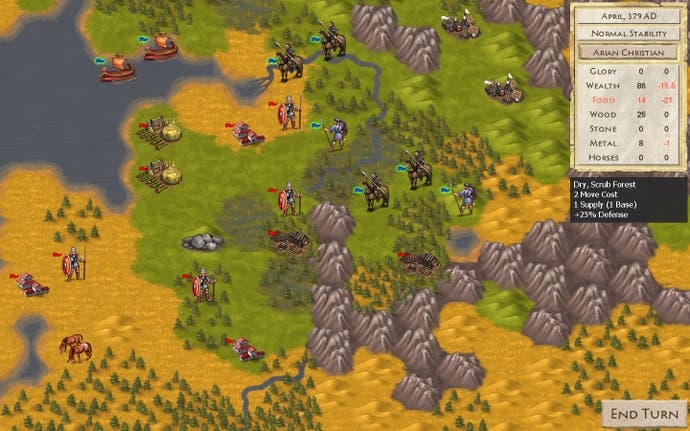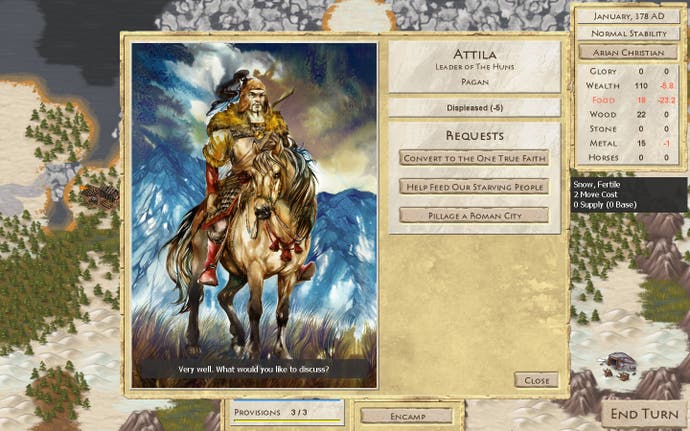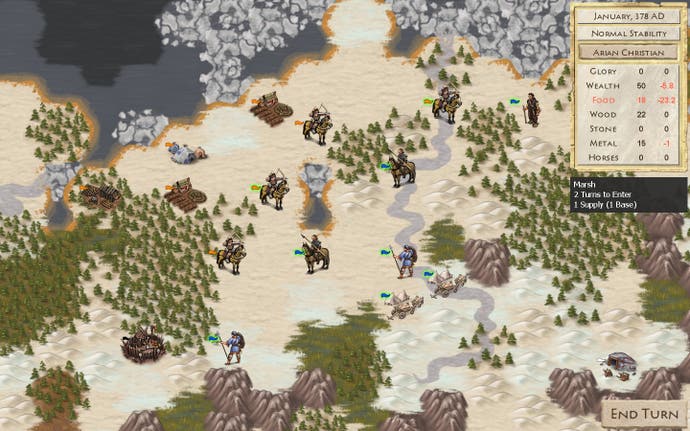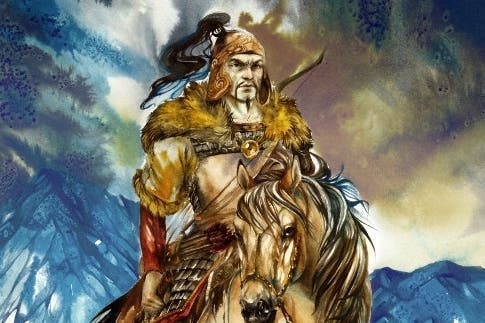Civ 5 designer returns with a fresh approach to 4X
At the Gates sets its sights on the fall of Rome.
Jon Shafer strikes me as a rather serious character - in photos, the 28-year-old designer looks like Woody the Cowboy's dutiful younger brother. For the last few years Shafer's been involved in a rather serious business, too. At Firaxis, he's crammed huge handfuls of human history into the controversial hexes of Civilization 5. Now, freshly incarnated as an indie at the helm of Conifer Games, his own micro-studio, he's holed up in a house in suburban Detroit with a few friends, and he's busy plotting the downfall of Rome.
Rome - the last, ugly years of the empire, at least - is the subject of At the Gates, Shafer's latest 4X turn-based strategy game, which breezed past its Kickstarter goal earlier this year, ending up with 265 percent of its funding. Inevitably, At the Gates is more sharply focused than Civilization, but its limited scope makes it fascinating. It's fascinating as a grimy window into a violent period of late antiquity, and it's fascinating as a response to Firaxis' gilded - and occasionally unwieldy - strategy colossus.
"I love difficult challenges to overcome," explains Shafer when I ask how he picks his projects. He could easily be talking about either game. "I like having these big, difficult problems to tackle. Some people might look at me like I was crazy, but it's just something I really enjoy. If there weren't as many challenges to overcome and ground to innovate on, I probably wouldn't be here."
Speaking of challenges, let's look at the big issues facing Europe in the year 375 AD, when At the Gates begins. Other games may cast you as the architect of the Roman Empire, but Shafer's more interested in seeing how you handle life in the shadow of its slow, undignified collapse.
In 375, Rome has seen better days. It's already been split into eastern and western empires, and now its institutions are stumbling and its influence is starting to diminish. Meanwhile, a handful of barbarian tribes vie to replace it.
This is where you come in. Faced with a world map that, in contrast to most 4X games, is far from empty at the start, you have to decide whether you're going to set sights on the vast bulk of Rome and finish it off, form an active confederation, or even cultivate a relationship that allows you to undermine the empire over time. In most 4X games, you're writing the story of the world from scratch: At the Gates drops you into a very different situation. It drops you into something that actually feels like a challenging Civ mid-game, in fact.

Civ is never far from Shafer's mind, I suspect. Early on in our conversation I ask him about the importance of the historical context for At the Gates and he laughs. "There's the story people and the gameplay people, and the truth is probably in-between," he says. "You want a game that evokes a theme and that feels like you're doing something, but you also want the mechanics to be fun. Hitting both of those is difficult, and when you pick a subject matter like all of history, that doesn't give you a lot of opportunities. So one of the things I've been trying to do with At the Gates is trying to draw upon the history of the era for the actual mechanics that I'm trying to incorporate."
This is seen most clearly in At the Gates' approach to technology. The collapse of Rome eventually led to the Dark Ages, a period that, as the name suggests, was hardly bursting with sky-minded invention. Shafer's replaced the standard tech trees, then, with a Romanization system, which allows you to take on perks from the fading empire as you capture its cities or help with its requests - little tasks leaders can set one another. Context gives your upgrade path a kind of historical rigour that's seen in the treats on offer - a better sort of catapult, for example, or increased resource production. It's a progression system fit for a world which is no longer moving forward in any meaningful sense.
At the Gates' keener focus also ties into the map. Along with Shafer's intriguingly limited scope comes a cosier pace. Each turn counts for a single month of in-game time. That sounds rather stately, but there's an excellent reason for it: seasons.
"Pretty much every 4X game has random maps," says Shafer. "We have those too, but additionally, for the last few years, I've always wanted to develop a game where the map evolves." Over the course of any 12 turns, At the Gates will walk you through all four seasons: rivers will flood and may then freeze, marshes will dry up, and snow will fall. When winter comes on hard, food will be trickier to find. When the ice retreats, it may take shortcuts with it, or free an enemy's warships. You'll constantly need to read the environment and adapt, both to what's happening now, and what you think might happen next.

This is Shafer's plan, of course. He's spent years watching players tackle 4X games, and he's aware that many designs support a kind of cruise-control leadership: you pick a strategy, implement it, and then sit back while it either succeeds or fails. Seasons offer an ideal counter to that - a lovely balance of predictability and randomness. As with the Romanization system, the context is key, although this time it's geographical rather than historical. If you're in the north of the map, you know you're probably going to get heavy snow in winter. Further south, it becomes more of a gamble - and we all know how players love to gamble.
"The key is to make sure that these events that are outside the player's control really fit into their expectations," reinforces Shafer, returning to what is clearly a favourite theme. "You could throw random stuff in the player's way in any game, but a lot of the time it's going to frustrate players or it just won't work. You need to have a setup where it makes sense and people accept it.
"Take Crusader Kings. It's a very character-based game, and characters die and get in feuds and all these sorts of things. Normally, in other games, if your character dies and things reset a little, you'd be really upset. I'm sure some people are upset when their character dies in Crusader Kings, but the vast majority of players know that this is a game about history, about characters, about people over centuries, and people die. This is how this should work, so I'm going to build my strategy around that limitation with this reality. That's when it really works."
Seasons aren't the only reason you'll be watching the map more closely than usual. At the Gates offers you a handful of resources that need juggling, and in a twist on the Civ formula, they'll be exhausted over time. Barbarian tribes build settlements rather than cities, and their settlements can be moved as new resources become available. Smart thinking: a system that pushes players to balance foresight and aggression - and to consider the lay of the land when they're planning constructions.
It's also Shafer's response to the classic 4X problem - namely, that the last two Xes aren't as much fun as the first two. By mid-game, exploration and expansion generally lay behind you, and you're faced with little to do but exploit and exterminate. These are both great strategy verbs, of course, but they're far more limiting. "Hence the need to migrate," says Shafer, noting, with obvious pleasure, that it also fits the historical context. "So rather than filling out the whole map and being done, you exhaust the resources in one region and then you have to go somewhere else. And then along the way, there may be an enemy in one region in your way and you have to decide to push through or change course. Instead of the micro-management of moving labourers around and focusing on specific tiles, you're thinking about things at a more general level. The resources really are the mechanic that gives the game its arc, too. In the mid-game, things get a little harder as your first set of resources start to run out. In the late game, you have to run a leaner operation and be more focused on your goals."
All of this, along with the traditional stresses of combat and diplomacy, mean that At the Gates' AI has its work cut out for it - and seeing as unpredictable AI was one of the primary criticisms of Civ 5, that means Shafer has his work cut out too. Speaking on his excellent podcast series a while back, he admitted: "Some of the things I've done in the past haven't really worked all that well." He added that, this time, he's going for a simple, segmented AI model.

"The thing about AI is that it's almost like making a completely new game," he says. "An independent layer that lives on top of the game. You need to be thinking not just, how does the economic system work and how does all this fit together? There's another level above that, which is, okay, now how does the AI understand this? What sorts of strategies will the AI use, and what sorts of mistakes will the AI make and how do you correct those?
"It's hard enough to make an AI that's competent, let alone an AI that gives a good feeling to the game," he continues. "I think the place you need to start is making the AI good at the game. It needs to know how to play the game, and then you can find places to inject personality: having them run various strategies, having them appear and say certain things, having them obey certain rules as to what trades they'll accept and what they won't based on which player it is, so that you get a feel for how they're unique. When you're reading a book, say, there are certain traits that make them an interesting character within that fiction."
It's another huge job, in other words - another difficult problem. That said, it's clear that, even here, Shafer is enjoying the autonomy to pick his battles. After Civilization, I wonder if there's a sort of perverse freedom that comes from not having to be quite so comprehensive any more.
"I could definitely see making a Civ game that's dramatically different," he says, "but when you're working with an established franchise you do need to still play it safe in some ways. We changed quite a bit with Civ 5 obviously, but not nearly as much as At the Gates.
"That's the thing that's great about being independent, right? You can work on whatever you want. Maybe you're the only one that's interested in that topic and you don't make any money - but you have that option at least."

